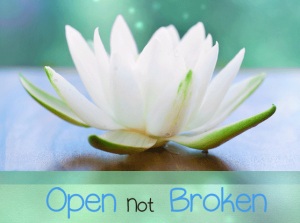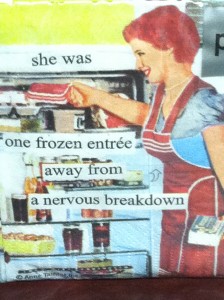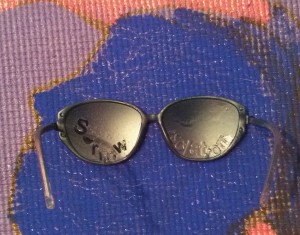Buddhist Pema Chodron teaches humans to sit still literally and internally. Instead of running away from fear and discomfort – the thing that fuels destructive behaviors – she suggests staying still and “being with” feelings instead.
Stephen Porges suggests people lose the “moral veneer” imposed on how humans survive trauma.
Both of them have a similar impact on me and make me:
- More observant and aware of feelings, desires and impulses.
- Less reactive to and judgmental of my own responses to fear.
Anything that helps me shed my “judgy” self when post-traumatic stress symptoms are cranked on high gets my attention.

This doesn’t mean symptoms don’t feel horrible – because sometimes they do. But, to see them as neither good or bad – just there – is oddly liberating in a culture big on stoicism.
It helps me release the vice grip of shame to distinguish between being a person who feels terrible things and being a terrible person.
It’s a big difference – as big as the one between pain and suffering.
Buddhists say pain is just part of life whereas suffering, which is angsting about being in pain, is optional. Or – as my friend said to me years back – feeling bad for feeling bad doesn’t help.
This is more than a perspective shift. It’s a genuine change in understanding traumatic stress symptoms as physical not personal.
NEUROCEPTION is the phrase coined by Porges to indicate the unconscious way the body responds to trauma via the nervous system . It, unlike perception (which implies choice) isn’t deliberate.
- Neuroception might be a sneeze whereas perception is the realization that getting a tissue or covering the nose might make less of a noise or a mess.
- Neuroception is the knee reflex that can’t be controlled when the knee is tapped but perception is apologizing if the foot kicks the doctor.
- These physiological responses are not even flawed choices, failed or lousy coping styles but how the body responded, adapted to and survived traumatic stress.

In this picture to the right we don’t blame the wood for freezing.
We know it was the water coming over the sea wall during am astronomical high tide coupled with the cold temperatures causing the freeze.
-
The wood isn’t failing to stay warm.
-
The wood isn’t fundamentally flawed, prone to freezing for any personal reasons reflecting the nature of the wood. The wood was placed a few feet from the ocean where it got excessively wet and cold and so it froze.
-
This couldn’t even happen to this wood on a warm day.
-
It’s not about the wood.
-
And it’s not about who or how we are, fundamentally, that causes post-traumatic stress. It’s about conditions, sensations and responses – in the body, made sense of by the mind and processed (or not) by our wider family or community as well as within a private self.
I know this is basic but it’s incredibly easy to forget when symptoms, reactions and responses get chalked up as weakness or a lack of resilience.
Imagine judging someone for having a bone so weak it broke when strained or taxed or stressed? That would be ridiculous and mean. But this is just what happens to trauma survivors who show evidence of a “broken” nervous system.
The shame and judging are not only imposed by others – outside society or inside the family – but by those of us who are trauma survivors. Many of us, myself included, get mad at ourselves.
I’ve inflicted boat loads of shame and hating on myself.
I used to view as personality flaws are what Porges would say are evidence of “blocked flow” thanks to trauma. Now, I have a more neutral view. Examples of blocked flow:
- Flatness in top part of face (with no crow’s feet or a lack)
- Lack of exuberance (or as I say – don’t let an emotion slip out)
- Monotonic voice (not everyone talks like they eat valium tic tacs)

- In fact, there’s a lot of overlap between those with autism spectrum and trauma survivors, says Porges.
- A nervous system detector in the body that just happens, as a response, as “neuroception” and isn’t chosen (or jumpy ass shit)
- Ex. fainting when terrified.
- A hypersensitive response to neutral or positive faces
- which can be impaired as trauma survivors are SUPER sensitive to negative and angry faces which they’ve learned (for self-preservation) to identify them and maybe be on alert for them.
- Of course, scanning for danger all of the time makes one expert at finding just that. To me, I think of it as similar to what happens you get a new car. You start to notice that color and model in parking lots, on the highways and in pick-up line whereas you had never seen one before. This car becomes familiar once it is yours.
- Well, this happens to trauma survivors who get the new car (trauma) repeatedly for years to decades and therefore see it on highways, back roads and parked in driveways.
- Difficulty getting close to other people at all and the pain that goes with isolation. This isolation also prevents healthy co-regulation.
- For example, in personal relationships, I tend to want to run just as I’m about to get close to someone. This doesn’t apply only to romance. When I start to get emotionally or physically close to someone or feel clingy or as though I may need them in anyway, I want to bolt. Not needing anyone or anything (thank you very much) has kept me feeling safe. The healthier and more promising the relationship – the more I want to bolt – the more it threatens how I operate and all of my expectations – and my feelings of safety – whereas a relationship destined to end badly have less anxiety because the outcome is known.

Understanding Polyvagal Theory doesn’t change my fear response to intimacy. It does help me change my response to my response.
I can notice my urge to bolt without actually packing my bags. That’s kind of huge.
I can get space, do yoga and then talk myself through the terror of finding another human desirable or appealing – you know – with the power to decimate me.
So, Polyvagal Theory, strange as it sounds, is super practical. It helps me grow my intimacy muscle. That’s huge.
But it’s Buddhism that helps me grow compassion. Getting under the fear (with guided imagery or free writing) gets me to new places where I think:
So what if I’m like a hand shy dog at times?
I might always be afraid of a hand when moving quickly by my face.
I might always flinch when afraid.
I remind myself skittishness is never helped by anger – not in animals or people. I ask myself what I want for my daughter, a brave and open heart or a “safely” defended heart.
After post-traumatic stress feeling safe with others is a challenge. It makes intimacy terrifying, as well as wonderful, and understanding that helps me stay still with myself.
I know I don’t have to stay living terrified or lonely. There are other choices.
See why I love learning about and studying Buddhism?
Voice Prosody
A baby is made to feel safe by the way a “good enough” parent interacts and speaks with him or her.
Voice prosody is that sing song voice we speak to our dogs (and sometimes cats) with. Voice prosody (which I think includes varied tone, pitch, pace and intonation) is critical because it conveys safety.
“Intonation of voice conveys psychological state, when people are talking with prosodic voices (that make people feel safe and comfortable)” the person hearing the prosodic voices knows the speaker isn’t going to cause hurt.”
The feeling of safety isn’t rational. We need to be with truly safe people as well. Knowing one won’t be hurt is sort of helpful for the safety thing… And the intimacy thing. And that’s relational not intellectual or abstract.
Porges says there are things we can do to increase our feelings of safety –which will be in the final and third blog post on the work of Porges.
What I love about Polyvagal Theory is the way it takes the emphasis OFF of fixing, shaming or curing sensations, reactions and responses to trauma and ON understanding, respecting and transforming them with acceptance.
This shift helps me think of symptoms more like crying babies that need nurturing rather than as threatening wasps that need to captured or killed before they sting.

I saw Pema Chodron on Super Soul Sunday a few weeks back and wrote down two things she said about dealing with difficulty.
- To acknowledge what is, how it feels and is right now, in this moment and in our bodies, without running.
- To just stay, sit and be with it. Kindly. Compassionately. Again – without running.
Chodron said if we could all make more space for discomfort or unease we could eradicate virtually every act of violence, neglect and pain humans cause the earth, each other and ourselves by running away from suffering.
Or, as a quote I saw on a catalogue once said:
If we don’t suffer who we are others suffer for us.
This is an invitation to be with our own “stuff” so we don’t impose it on others the way others have inflicted their unresolved “stuff” on us.
I guess what works for all humans working to attain enlightenment works for trauma survivors with post-traumatic stress.
Porges and Pema help me feel safe, human and at home in my body and the world. They help me most by helping me understand why I sometimes can’t feel more safe, human and at home in my body or the world. That understanding makes me feel more cozy and warm inside.
I’m grateful.
Further Reading
- Previous interview transcribed covering similar though not identical content.
- Porges website.
- Memoir essay I wrote after first hearing the work of Porges.
You Matter Mantras
- Trauma sucks. You don't.
- Write to express not to impress.
- It's not trauma informed if it's not informed by trauma survivors.
- Breathing isn't optional.
You Are Invited Too & To:
- Heal Write Now on Facebook
- Parenting with ACEs at the ACEsConectionNetwork
- The #FacesOfPTSD campaign.
- When I'm not post-traumatically pissed or stressed I try to Twitter, Instagram & Pinterest.

You have made neuroception understandable. I like the metaphor of the ice covered bench. Looking forward to the third post on Porges and his polyvagal theory. BTW, What is Super Soul Sunday?
Thank you Margaret! Super Soul Sunday is a show on Sunday with Oprah where she interviews artists, spiritual and thought leaders of all kinds.